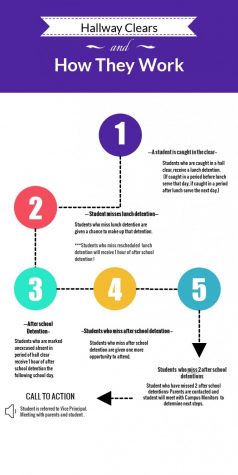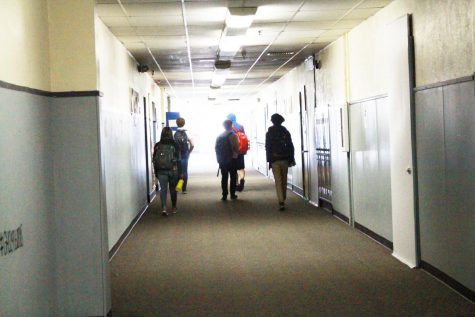Hallway Clears Cause Controversy Among Students
April 18, 2019
The bell rings. Students run down the hallways. Doors close and lock. Administrators stand in the hallway with their clipboards ready to write students a detention. Hallway clears are in full effect.
On February 7th, 2019, Gresham High School announced a new rule to help students attendance and timeliness. This new rule resu

lted in “hallway sweeps”, which were recently changed to the “hallway clears”. After years of low attendance and excessive tardiness, administration has recognized that action needs to be taken.
The state requires 90% of students to attend school 90% of the time, but Gresham High School’s percentage for attendance is at a 72%, according to assistant principal Erin Voelker.
There is a specific system to hallway clears, and consequences for students. After the final bell of a specific period of the day, teachers lock their doors leaving the remaining students in the hallway. Those caught in the hallway will be given an automatic lunch detention for being late. Teachers know when to lock their doors due to an email that is provided before hallway clears begin. Some students believe that the school is only focusing on the tardiness of students and not their absence rate, which seems to be a larger problem.
“I don’t think the new rule will help our attendance because if you talk to the principal about it, they’re focused on them fixing the tardy problem, but not looking at the absence problem,” sophomore Lily Sweeney said.
Because of this new rule and the detention students may have to face if tardy, many students say if they are late to class and a hallway clear is happening, they just decide to skip that class. However, administration is supposed to follow up with students who receive an unexcused absence for the hallway clear period, and give them a possible detention as well.
A substantial amount of staff argue that hallway clears are actually improving the attendance and tardy rate dramatically. Being on time to class, according to many teachers, is a large part of being successful in school.
“If students just keep showing up to class on time and they are timely, they will be successful,” Voelker said.
Many teachers and administrators believe that being tardy is keeping students from being successful.
“You can’t learn, and not because you don’t have the ability to learn but if you’re not there to hear it, you will never understand it right, then you miss a couple of days in a row, then you’re further behind, which makes it easier to not keep going right?” Voelker said.
It is important to be one time, according to many teachers, because the first five-ten minutes of class seem to be very important for many teachers and students.
”For most teachers, the very beginning of class is the time when there is some of the most important information being given out,” English and social studies teacher Rachel Fortgang said.
A common mentality amongst students is the belief that as long as you keep up in class and do your work, you will be able to pass, you do not have to be there on time. Many students say that passing time and lunchtime are too short and it is hard to get to class on time with these time constraints.

Tardy students walking to class.
“Passing time is way to short for me to get to one class and to another, so sometimes it’s hard to be on time,” junior Rebecca McMurry said.
Teachers and staff question that statement by asking how can you keep up if you’re not on time?
“Making sure that you attend all of your classes is a great start….because if you don’t get to class then you won’t pass,” Voelker said.
Overall, attendance and timeliness are important at Gresham High School. But many students feel targeted by this new rule, making them feel more afraid of the staff here at GHS.
“Sometimes, I don’t want to even go to class if I’m late because I’m so afraid to get a detention slip from the people doing the hallway clears,” McMurry said.
This new rule does seem to be getting more students to attend class on time, but many students believe it to be unfair. It does not seem to be addressing the underlying issue that passing periods are too short to allow students to use the restroom or to stop at their locker.
“They don’t take into consideration kids who aren’t trying to skip or be consistently late. If someone has to go to their locker or the bathroom and ends up late to class, they could be disciplined [while] not doing anything wrong,” junior Isabella Figueroa said.